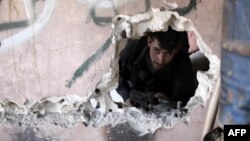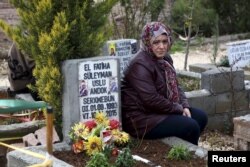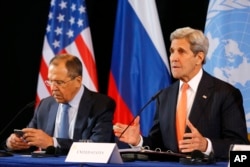The cease-fire in Syria that began Saturday has mostly held, but there have been some incidents of violence.
State media report a car bomb explosion on the outskirts of the central city of Salamiyeh in Hama province killed two soldiers. No one has claimed responsibility for the blast near the town's entrance.
Elsewhere, clashes between government forces and rebel groups were reported in Latakia province near the Turkish border.
The truce, brokered by the United States and Russia, took effect at midnight Friday Damascus time (2200 UTC). The Syrian opposition’s umbrella group, the High Negotiations Committee, said in a statement that 97 groups have promised to take part in the cease-fire.
The truce does not apply to Islamic State and the al-Qaida-linked al-Nusra Front terror groups.
Less than an hour before the temporary truce went into effect, members of the U.N. Security council unanimously endorsed the deal in New York.
At the same meeting, U.N. Syria envoy Staffan de Mistura announced that if the truce largely holds and humanitarian aid access continues, he will reconvene intra-Syrian peace talks March 7 in Geneva.
"Saturday will be critical," de Mistura told the council via a video link from Geneva. "No doubt there will be no shortage of attempts to undermine this process. We are ready for it — we should not be impressed, we should not be overly concerned."
He said after the meeting that a report he received at three minutes after midnight Damascus time indicated that both Darayya and Damascus had calmed down.
The cessation of hostilities will apply to all of Syria, except for areas where the so-called Islamic State and another armed group, Jabat al-Nusra, operate, as well as terrorist groups already designated by the Security Council.
The co-chairs of the International Support Group for Syria (ISSG) — Russia and the United States — will be responsible for addressing violations, not the U.N.
U.S. President Barack Obama said the United States will do everything it can to make the agreement hold.
Friday, U.S. State Department spokesman Mark Toner said the United States has received assurances from Russia that it would not launch strikes against the "moderate opposition" in Syria after the truce takes effect. He said it is "put up or shut up time" for Russia to show whether it is serious about stopping the fighting.
Russian bombing
Before the cease-fire took effect, Russian warplanes Friday continued bombing what the Kremlin calls "terrorist organizations." Russian President Vladimir Putin told reporters Friday that Russia plans to continue its bombing campaign against Islamic State and the al-Nusra Front.
Several security council members expressed concern that the aerial bombardments increased in the lead-up to the midnight truce. They also expressed skepticism about their continuation.
"It is hard to seem serious and sincere about ceasing hostilities when you ramp up fighting right up to the minute the cessation of hostilities is to take effect," said U.S. United Nations Ambassador Samantha Power.
France's ambassador, François Delattre, called the intensification of bombardments "a bad omen."
Russia's deputy foreign minister, Gennady Gatilov, who is in New York, said at the meeting that Russia would continue to combat terrorists because Syria could not be stable until their threat was eliminated.
Support for talks
All council members stressed the importance of a cessation of hostilities leading to meaningful political talks.
"If we can make this cessation of hostilities hold — which is a very big if — we will take a genuine step toward that political solution we have talked about for so long," Power said.
Proximity talks convened that Jan. 29 in Geneva fell apart nearly immediately. De Mistura called on the Security Council and members of the ISSG to "ensure that the parties come to Geneva again. Ready this time to engage and stay, and stay engaged on the substantive issues."
De Mistura told reporters in Geneva after his briefing to the council that he expects the next round of intra-Syrian talks to last at least three weeks. The previous round of talks collapsed after three days.
Lavrov disdains 'Plan B'
On Friday, Russian Foreign Minister Sergei Lavrov hosted a meeting in Moscow of the Russian-Arab Cooperation forum, where he pledged that the gathering would focus on ending the conflict in Syria.
Lavrov also said the cease-fire's success depended in part on the U.S.-led coalition refraining from talking about "some sort of Plan B, about preparing a ground operation, about the creation of some sort of useless buffer zone," AFP reported.
If Russia and the Syrian government don't respect the cease-fire agreement, U.S. Secretary of State John Kerry has warned that Washington would consider a "Plan B."
Lavrov voiced concern that Syria's main opposition group said it would honor the cease-fire only for two weeks.
"The Russian-American initiative does not foresee any preliminary conditions and qualifications," AFP quoted Lavrov as saying. The Russian official also criticized Obama for again saying Thursday that Syrian President Bashar al-Assad should step down to ensure a lasting peace.














